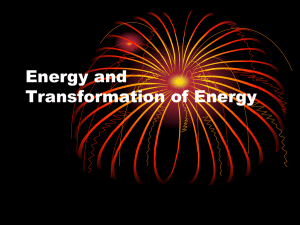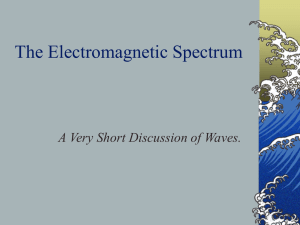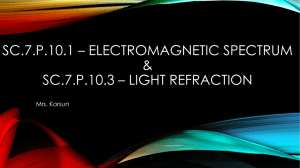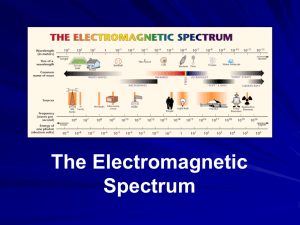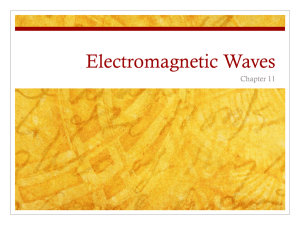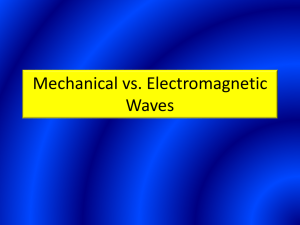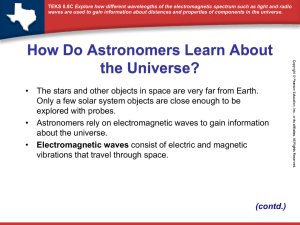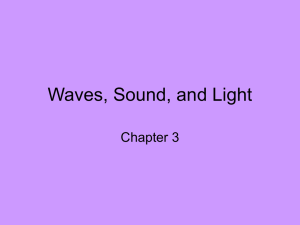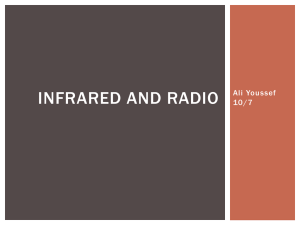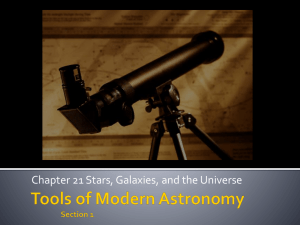Electromagnetic Waves
advertisement
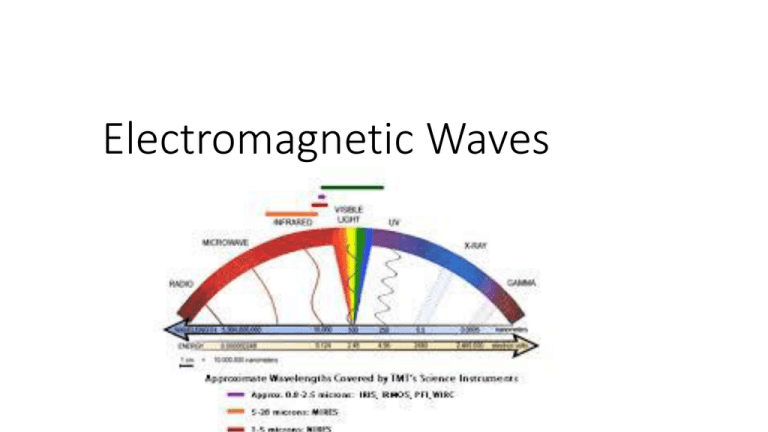
Electromagnetic Waves • An electromagnetic wave a disturbance that transfers energy through a field. • Electromagnetic waves are called EM waves • There are electromagnetic waves all around us • Light is made up of electromagnetic waves. When ever you feel the heat from the sun you are experiencing electromagnetic waves • How are they different from mechanical waves? How EM waves form EM waves occur when electrically charged particles move. The charged particles exert an electric force on each other. They now have electric fields. A moving charged particle creates Magnetic force. A moving charged particles also has a magnetic field around it. Sources of EM Waves • Most of the EM Waves come from the Sun. Other Stars also give off EM Waves but are to far away to affect us EM waves can travel in a vacuum • Energy that moves in the form of EM waves are called radiation • EM waves do not need a material medium to travel How EM waves travel • EM waves spread outward from the source until they until they reach something that interferes with them. • The farther the waves move from their source, the more spread out they become. • As they spread out the waves have less and less energy • Only a small amount of the suns radiation reaches earth , but it is still enough to sustain life on the planet • The sun’s radiation travels 93 million miles to reach earth ( takes about 8 minutes to reach Earth) How fast do EM waves Travel? •In a vacuum EM waves travel about 186 miles per second.( 7 times the distance around earth (This is also called the speed of light) •The sun is 8.3 light minutes away from the Earth Speed of Light Electromagnetic waves can interact with material medium EM waves respond to a medium by reflecting, refracting, or diffracting. The direction of the wave changes and the direction in which the energy transferred also changes EM Waves transfer energy When in a vacuum EM waves only transfer energy by moving potential energy from one place to another. EM waves interact with matter the energy can be converted into many different forms Converting Energy from one form to another Microwave 1. A device on a microwave produces microwaves. They are then sent to a reflecting fan 2. The blades of a fan deflect the microwaves in many directions 3. Microwaves move through the air without transferring energy to the air 4. Microwaves transfer energy transfers the energy to the water molecules inside the food in the form of heat The Electromagnetic Spectrum Define Electromagnetic Spectrum The range of all EM waves is know as the Electromagnetic Spectrum On the left are waves that have he longest wavelength and the lowest frequency The Electromagnetic Spectrum On the right the wavelengths become shorter and the frequency and energy becomes higher Radio waves Have the longest wavelength and the lowest Frequency Microwaves – shorter wavelength, higher frequencies and higher energy than Microwaves. Uses: radar and cell phones Visible light – Is the part of the spectrum that the human eye can see. Only about 1/100,000 of the complete EM Spectrum Infrared light is between microwaves and visible light on the EM spectrum. Often called heat rays. You can feel it as warmth from the sun Some animals can see infrared light Viper Snake!!! Ultraviolet Light has higher frequency that visible light. It carries more energy that visible light Use to sterilize instruments because it can damage cells Some animals can see ultra violet light X-Rays and Gamma Rays Have high Frequency and High Energy Uses of X-rays and Gamma Rays
